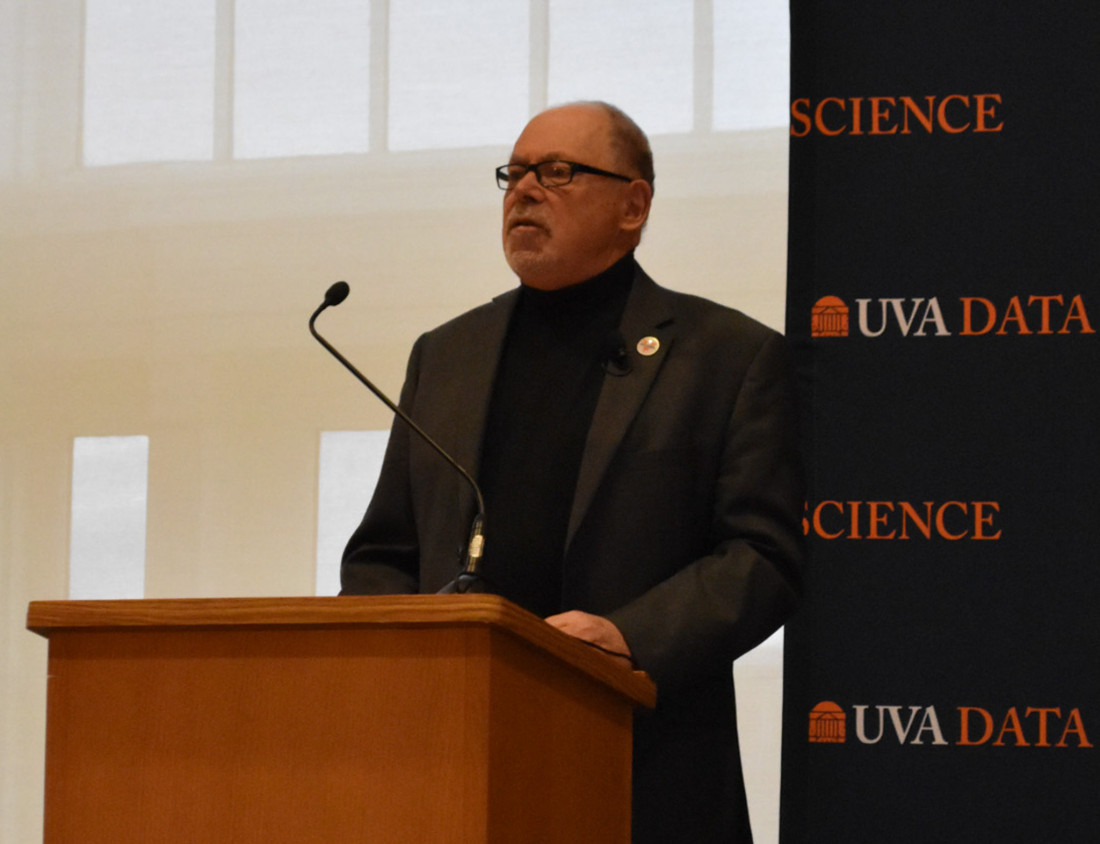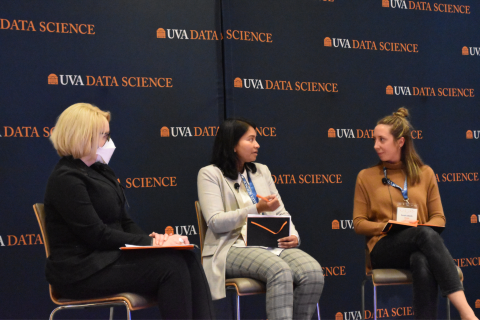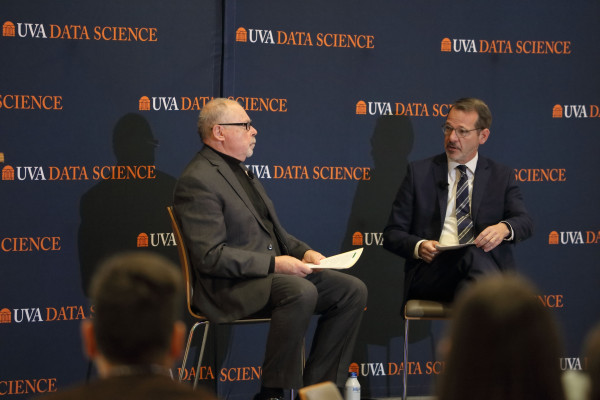Key Takeaways from Datapalooza 2023

The role of data science in shaping the future was at the heart of the wide-ranging panel discussions and presentations at Datapalooza 2023, an annual conference hosted by the University of Virginia's School of Data Science.
Attendees heard experts from academia and the private sector share insights on topics ranging from the future of data science education to the rapid evolution of artificial intelligence.
Here are some key takeaways from Datapalooza 2023:
The future is now in higher education
The day-long event, held on Nov. 10, kicked off with a discussion featuring Phil Bourne, founding dean of the School of Data Science, and Ian Baucom, UVA's executive vice president and provost, who officially launched the Futures Initiative, a new pan-University project aimed at charting the future of higher education.
Over the next year, a group of thought leaders from across the University, known as the Futures Initiative Group, will examine the current drivers of change in academia, such as AI, while also looking ahead to the eventual impact of sensor technology, virtual classrooms, and other technological changes. The project will include a series of podcasts and town halls, with the ultimate goal of developing recommendations for University leadership on how to best chart a path forward so that UVA is proactive, rather than reactive, to external events.
"It's very hard to get out in front of these things, but I think we need to try," said Bourne.
"We can't do it as individuals; we need to do it as a collective," he added.
Baucom discussed ways that the University has sought to address accelerating technological changes such as the emergence of generative AI.
The stakes for students, Baucom said, were considerable, given that employers are now expecting graduates to be AI literate.
"Every class we graduate moving forward is entering into a transformed world, and we need to get them ready," he said.
The opening session also included remarks from Scott Stephenson, the founder of SGS Capital and former chairman, president, and CEO of Verisks Analytics.
Stephenson, who chairs the advisory board of the School of Data Science, addressed the tendency of private sector firms to classify job applicants according to certain buckets, such as data engineers versus data scientists.
"I wouldn't advise the young people in our meeting here today to be overly concerned about which bucket you start in," he said. "You should think of yourself as being able to serve in any one of those buckets."
Data science education: Inclusive, fun, and sometimes 'messy'
Datapalooza also focused on the future of data science education, with a panel that included the directors of the various degree programs at the School of Data Science. Prince Afriyie, director of the residential master's program, said that expanding the reach of the field was critical.
"How do we get to everybody?" Afriyie said should be a guiding principle of planning for data science education in the years ahead. A key part of that, he explained, is hiring faculty with diverse academic backgrounds.

Tom Stewart, director of the doctoral program, said that attracting and encouraging students with a wide range of backgrounds to pursue data science was key.
"I think it's creating different points of entry and being OK with that," Stewart said in explaining how he approaches developing "different pathways" for students who may not have all of the foundational skills in certain subjects but want to pursue advanced degrees in data science.
Brian Wright, who leads undergraduate programs, noted that the program's 700 minors come from all different majors and perspectives.
"The nonconformist nature of the students coming into the classroom ends up being one of the most joyous parts of it, because it can be really fun," Wright said of the undergraduate data science program, which, beginning in fall 2024, will also allow students to pursue data science as a major.
In addition to attracting people from different backgrounds, approaching data science in a different way can be important, the panel noted.
Jon Kropko, director of the online master's program, touched on one aspect of how data science should be different than some other fields. He explained how his classroom data training was in econometrics where regression analysis would be performed on "clean" data sets -- which, he said, are in reality "a fantasy world."
"I think that one of the things that data science can and should do that is maybe a little bit nontraditional in an academic sense is, let's give people horrible, messy data that will make people's heads explode," Kropko said.
AI's impact on society, education is profound
AI was a focus of multiple sessions, as the technology continues to evolve and expand its footprint in the classroom and the economy. One panel focused on the future impact of AI on society -- both for better and worse.
One issue underlying the use of AI and machine learning is the quality of data that goes into the technology's development. Sarah Lebovitz, an assistant professor of commerce at UVA, noted the challenges that could arise with using machines to conduct medical diagnoses.

"With diagnosis, the data that trains the machines is sometimes simply what's available to developers and not necessarily the highest quality data out there," she said, laying out an example where a machine used to detect breast cancer could be based on one image, while a radiologist may, over time, base their diagnoses on fuller set of considerations.
Another issue that came up was AI's impact on the workforce. Larry Medsker, a research professor at George Washington University, said that companies often say that jobs lost due to the adoption of a new technology will lead to many more created.
"The trouble is, are the new jobs going to be available to the people who lose their jobs and at the same pay?" he noted.
A key point, said Farhana Faruqe, an assistant professor of data science at UVA, is finding ways to use AI as a complement to human skills and contributions.
"From my point of view, we will be very successful when we learn to work together as a team," she said.
Another panel focused specifically on the impact of AI in education and included members of a UVA task force that examined generative AI in teaching and learning.
"Part of what's tricky for non-technologists is that many of us feel behind the students," said Andy Pennock, an associate professor at UVA's Batten School of Leadership and Public Policy, discussing how many students are much better versed in certain AI tools than their professors.
He added that as educators think about generative AI, "it requires humility and a willingness to give up ways that we've been teaching for a long time." Still, one fear he mentioned was that students will stop reading scholarly articles in favor of AI technology that synthesizes research into key points.
"If that's the reality, then I have to design a new way of learning," Pennock said of how professors will have to address this development.
The future brings challenges and opportunities
Nearly 700 attendees signed up to attend Datapalooza either virtually or in person. The conference also included sessions where current and prospective students could receive academic advice or learn more about the different degree options at the School of Data Science.
In addition to panel discussions on education and artificial intelligence, Datapalooza included talks on the impact of data science on health care, its potential for yielding insights on the environment, and more. The breadth of the day's program was a reflection of this emerging field's potential to positively shape the future and the countless opportunities the next generation of data scientists -- the current and prospective students at UVA's School of Data Science -- will have to help write that story.
As he concluded the event, Bourne was asked whether he sometimes felt "overwhelmed" by how many things were happening in technology and society.
"It is overwhelming, but at the same time, it's incredibly exciting, and we're all on this journey," he said.
"Hopefully, all of us together will make a difference."

